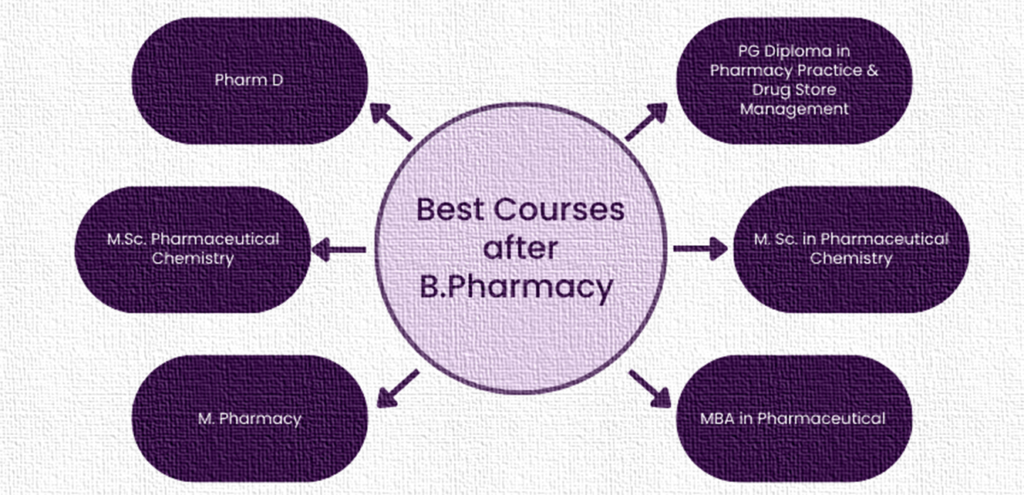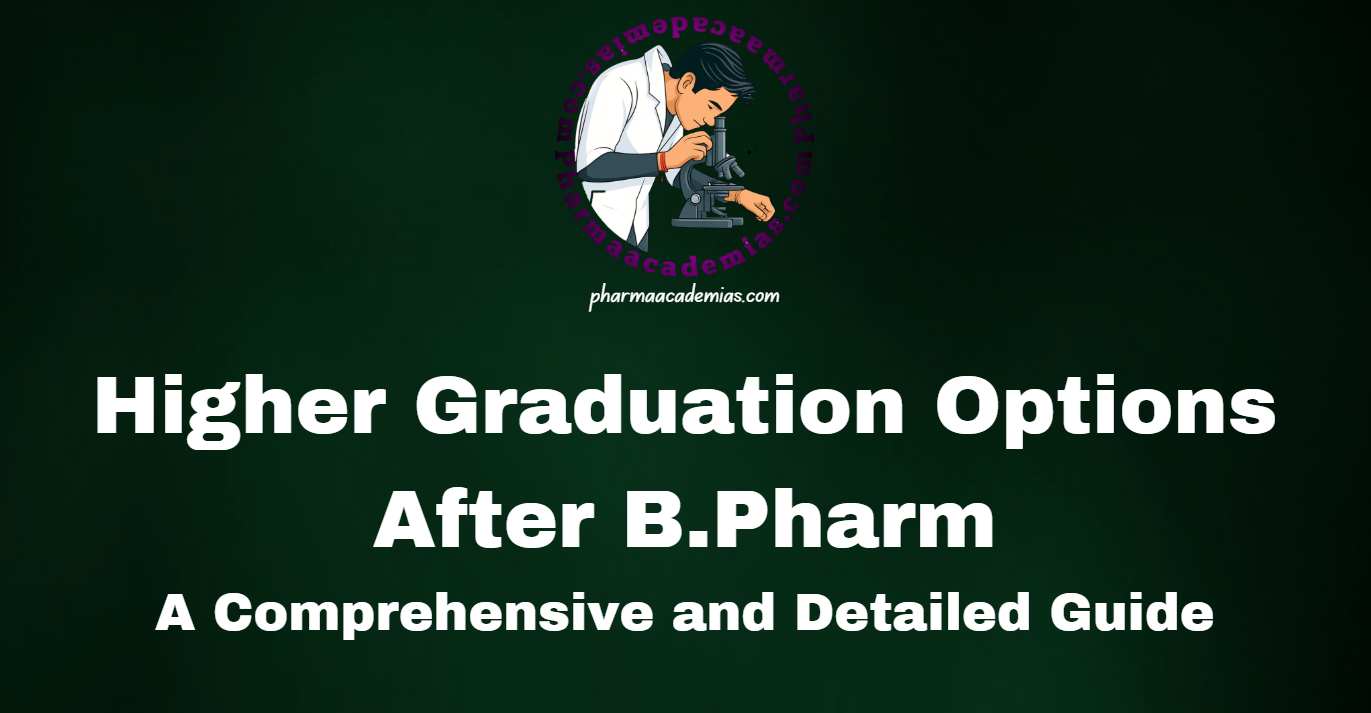Higher Graduation Options After B.Pharm
Higher Graduation Options After B.Pharm: The Bachelor of Pharmacy (B.Pharm) is a professional undergraduate degree that serves as the foundational platform for a wide array of academic, research, industrial, clinical, and entrepreneurial pursuits in the pharmaceutical sciences and allied healthcare domains. After successfully completing a B.Pharm degree, graduates are presented with a multitude of choices to pursue higher education, each tailored to specific interests, strengths, and career goals. These opportunities not only allow for academic advancement but also offer a means to specialize in particular fields and enhance one’s employability, both in India and abroad.

This guide explores the most relevant and promising postgraduate pathways for B.Pharm graduates, elaborating on degree options, eligibility, career scope, institutional preferences, and future opportunities.
I. Academic and Research-Oriented Higher Studies
1. M.Pharm (Master of Pharmacy)
This is the most natural and commonly pursued postgraduate degree after B.Pharm in India. The M.Pharm program is a two-year postgraduate course that allows students to delve deeper into their area of interest and gain advanced knowledge, research experience, and practical skills.
- Eligibility: Completion of B.Pharm with a minimum aggregate (usually 50–60%) and qualification in GPAT (Graduate Pharmacy Aptitude Test) for scholarships and admission in reputed institutions.
- Specializations:
- Pharmacology – Focuses on drug action, mechanisms, and therapeutic uses.
- Pharmaceutics – Involves formulation, manufacturing, and drug delivery systems.
- Pharmaceutical Chemistry – Deals with synthesis and analysis of drug molecules.
- Pharmacognosy – Study of natural products and herbal medicine.
- Pharmaceutical Analysis – Concerned with quality control and validation of drugs.
- Regulatory Affairs – Covers documentation and compliance with global drug laws.
- Industrial Pharmacy – Emphasizes pharmaceutical manufacturing technologies.
- Top Institutes: NIPERs, Jamia Hamdard, BITS Pilani, JSS College, Manipal College of Pharmaceutical Sciences.
- Career Options: Research scientist, quality control/assurance analyst, formulation scientist, academician, regulatory affairs executive, etc.
2. M.S. in Pharmacy/Pharmaceutical Sciences (Abroad)
Pursuing a Master of Science (MS) abroad is an excellent option for students looking for global exposure, advanced research infrastructure, and better job prospects. Countries like the United States, Canada, the UK, Germany, and Australia offer world-class pharmacy education and research opportunities.
- Eligibility: B.Pharm degree, proficiency in English (IELTS/TOEFL), and GRE scores (for USA).
- Specializations Abroad:
- MS in Pharmaceutical Sciences
- MS in Drug Discovery and Development
- MS in Clinical and Translational Research
- MS in Regulatory Science
- MS in Biopharmaceutics
- Advantages:
- Access to cutting-edge research facilities
- Diverse academic culture
- Lucrative career opportunities in multinational pharma companies
- Opportunity to settle or pursue further studies (Ph.D.) abroad
II. Clinical and Healthcare-Oriented Postgraduate Studies
3. Pharm.D (Post Baccalaureate)
The Doctor of Pharmacy (Pharm.D – PB) is a professional doctoral program that focuses on clinical practice and patient-centered care. It prepares graduates to work as clinical pharmacists in hospitals and healthcare systems, especially in countries where the clinical pharmacy model is well-established.
- Duration: 3 years (2 years coursework + 1 year internship)
- Eligibility: B.Pharm completion from a PCI-approved institution.
- Curriculum: Clinical pharmacology, hospital pharmacy, pharmacotherapeutics, clinical toxicology, and patient care.
- Scope:
- Clinical Pharmacist in hospitals and ICUs
- Medication Therapy Management (MTM)
- Research associate in clinical trials
- Scope for international employment in countries like the USA, Canada, UAE, and Australia
4. M.Sc. in Clinical Research / Pharmacovigilance / Regulatory Affairs
M.Sc. programs related to pharmaceutical healthcare practices are gaining tremendous popularity due to the booming clinical trials and drug safety industries.
- Focus Areas:
- Clinical Research – Design and monitoring of clinical trials, data analysis, regulatory submissions.
- Pharmacovigilance – Monitoring and reporting adverse drug reactions (ADRs), signal detection, risk management.
- Regulatory Affairs – Ensures drug approval and compliance with national and international regulations.
- Institutes: ICRI, Cliniminds, Manipal, Jamia Hamdard, DIA India, etc.
- Career Options:
- Clinical Research Associate (CRA)
- Drug Safety Associate
- Medical Writer
- Regulatory Affairs Officer
5. M.Sc. in Biotechnology / Biomedical Sciences / Toxicology
This route is ideal for students interested in combining pharmaceutical sciences with biological research and innovation. These programs offer avenues in biotech-based drug development, molecular biology, and diagnostic research.
- Career Prospects:
- Biotech industry (R&D, QC, QA)
- Clinical diagnostics
- Biomedical device companies
- Environmental and food toxicology labs
III. Business and Management Studies
6. MBA (Master of Business Administration)
For B.Pharm graduates looking to enter the managerial and administrative side of the pharmaceutical and healthcare industries, an MBA is a viable and lucrative option.
- Specializations for Pharmacy Graduates:
- Pharmaceutical Management
- Healthcare and Hospital Management
- Marketing and Sales
- Operations and Supply Chain Management
- Top Institutes: NMIMS, IIMs, SIES, Manipal, Jamia Hamdard, IIHMR
- Career Roles:
- Product Manager
- Pharma Sales & Marketing Executive
- Brand Manager
- Hospital Administrator
- Healthcare Consultant
IV. Public Sector and Competitive Examinations
7. Government Exams & Career Opportunities
B.Pharm graduates can also prepare for a variety of government jobs by appearing in competitive exams.
- Exams:
- GPAT – For M.Pharm admission and scholarships
- NIPER JEE – For postgraduate education in elite institutes like NIPERs
- UPSC – For Drug Inspector, Food Safety Officer, and Administrative roles
- SSC / State PSC – For Pharmacist and Analyst posts
- Railways / ESIC / Army Medical Corps – For paramedical and pharmacist positions
V. Doctoral & Advanced Research Degrees
8. Ph.D. in Pharmaceutical Sciences or Related Fields
For those passionate about research, innovation, and academia, pursuing a Ph.D. is the best path forward. It enables a deeper understanding of specialized topics, independent research, and publication in scientific journals.
- Eligibility: M.Pharm or equivalent postgraduate degree
- Funding: CSIR-NET JRF, GPAT-JRF, DBT, DST, and ICMR fellowships
- Institutes: NIPERs, IITs, IISc, JNU, BITS, etc.
- Career Pathways:
- Scientist in pharmaceutical R&D
- Academic positions in pharmacy colleges and universities
- Post-doctoral research abroad
VI. Certification and Diploma Programs
9. Short-Term and Professional Certification Courses
There is a wide range of certification and diploma programs that offer skill-specific training for job-oriented careers in the pharmaceutical and healthcare sectors.
- Popular Courses:
- Certificate in Pharmacovigilance
- Certificate in Medical Writing
- Certificate in Regulatory Affairs
- Diploma in Clinical Data Management
- PG Diploma in Intellectual Property Rights
- Certificate in SAS Programming for clinical trials
- Duration: 3 months to 1 year (flexible, online/offline)
- Institutes: ICRI, Biopharma Institute (USA), Udemy, Coursera, PharmaLeaf
VII. International Licensing and Career Opportunities
10. Foreign Licensing Examinations
B.Pharm graduates aspiring to practice pharmacy in countries like the USA, Canada, UK, or Australia must clear certain licensing exams:
- USA: FPGEE + TOEFL + NAPLEX + MPJE
- Canada: PEBC (Pharmacy Examining Board of Canada)
- UK: OSPAP + GPhC registration
- Australia: KAPS (Knowledge Assessment of Pharmaceutical Sciences)
- New Zealand: NZREX or similar exams
These pathways open up careers in clinical pharmacy, community pharmacy, hospital pharmacy, and consultancy roles in developed healthcare systems.
VIII. Allied Courses and Interdisciplinary Degrees
11. Master of Public Health (MPH)
- Focus on epidemiology, community health, health policy, and disease prevention.
- Career in government health agencies, WHO, NGOs, etc.
12. Law (LLB in IPR and Patent Law)
- Specialize in Intellectual Property Rights (IPR) and become a Patent Attorney in the pharmaceutical domain.
13. Health Informatics and Health Economics
- Newer fields involving data analytics, artificial intelligence, and pharmacoeconomics in healthcare decision-making.
IX. Entrepreneurship and Business Ventures
14. Own Pharmaceutical or Healthcare Venture
- Set up a manufacturing unit, retail pharmacy, nutraceuticals, or ayurvedic formulations business.
- Requires knowledge of Drug & Cosmetic Act, GMP compliance, licensing, and marketing strategies.
Conclusion
In conclusion, a B.Pharm degree acts as a robust gateway to a spectrum of higher education and career opportunities. Whether one chooses to dive deeper into pharmaceutical sciences through research, step into the corporate world via MBA, work directly with patients through Pharm.D, or move abroad for further studies, the scope is vast and ever-expanding. The choice of path should align with your passion, long-term vision, financial capacity, and aptitude.

